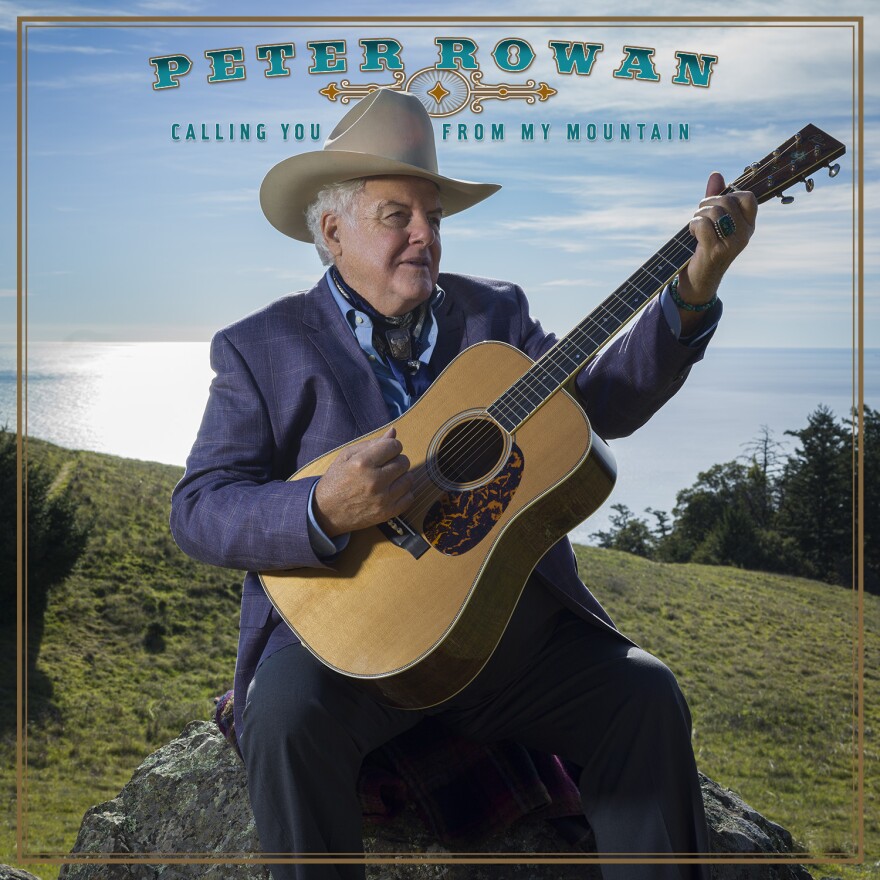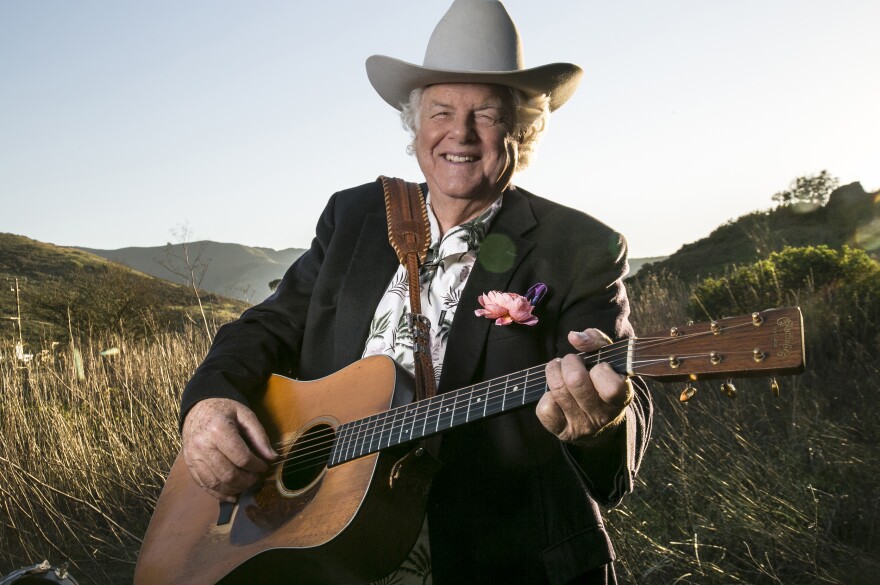American original Peter Rowan will turn 80 on Monday, the Fourth of July. He’ll be gathering with old friends at a pizza place/ brewery in Mill Valley, CA. “I’m hoping Ramblin’ Jack Elliott will be able to make it!” Rowan says from his Marin County home sounding jovial and expectant. “I've talked to him, and he says he's going to do it.” And there will of course be music. “It'll go all the way from just acoustic storytelling, through bluegrass, and up into some good rockin’ blues. And, you know, we’ll probably end with ‘Midnight Moonlight’ - a few hours before midnight moonlight!”
Anyone who’s heard Rowan’s indelible “Midnight Moonlight” - on the influentialOld And In The Way album with Jerry Garcia, or live in concert with one of his diverse roots bands, or sung around a fire by festival pickers who’ve adopted it as a standard - knows that nobody could better embody the ideals of Independence Day than he. Since emerging in the 1960s, Rowan has built a house of music all his own. Its foundation is bluegrass and the blues, but he’s built colorful rooms for Mexican music, country, rock and roll, Hawaiian, Native American and reggae. Rowan’s first big job was for Bill Monroe, the father of bluegrass, in the mid 60s. Then he founded two of the seminal bands of progressive bluegrass within a year of one another - Old And In The Way and Muleskinner - while never losing the respect of the traditional bluegrass world. He is literally and figuratively a Bluegrass Boy (the title of his 1996 album), who has lived the example of how diverse and dynamic that genre can be.

June 24 saw the release of Calling You From My Mountain on Rebel Records, which comes in the middle of an impressive roll for a septuagenarian. It’s Rowan’s fifth album since 2013’s The Old School, also a trad bluegrass project. His spirit of collaboration remains undimmed, with guest turns on Mountain from Molly Tuttle, Billy Strings, Shawn Camp and Lindsay Lou. And he steps into the fray of 2020s America with songs about war and peace, freedom and oppression. After 2018’s bluegrass album Carter Stanley’s Eyes, Rowan had in mind a song cycle inspired by Hank Williams and his gospel alter ego Luke The Drifter, but the pandemic sent him inward, resulting in new songs and others culled from old notebooks that had never been recorded.
“I thought it was just time to talk about what was going on,” Rowan says. “Remember, this was COVID. This was the Trump era. This was the great division of our country, you know? And it's not over. It's going on, you know it seems to be, and I had to write about it.” In “The Red, The White and The Blue,” Rowan takes a wistful look at the unity that bound the nation together in the time of his birth during World War II. Set to a tender Carter Family lilt with Tuttle’s clawhammer guitar chiming in like Mother Maybelle’s autoharp, Rowan seems to lament that now war has broken out at home and he resolves not “to feed the war machine.” That transitions to “Light At The End Of The World,” which resurfaced from Rowan’s pen of 50 years ago. He wrote the grassy waltz on tour in 1971 upon a visit to Hiroshima, Japan. It contrasts some immediate imagery - origami cranes made by children for the memorial - with apocalyptic visions.
Also global in its outlook and origins is the title(ish) track “From My Mountain (Calling You),” an especially beautiful new Rowan original inspired by his longtime friend Yungchen Lhamo. According to the liner notes and her bio, she fled her native Tibet in 1989 as the Chinese invaded, carrying her child on a 1,000 mile trek through the Himalayas into a new life that saw her climb to global stardom. Rowan toured with Yungchen for a time, taking her to roots and jamband festivals, where she met a new world of music. “She's such a pure singer,” Rowan says. “And when I met her, that's when I wrote ‘From My Mountain,’ just thinking of her and her journey, you know, that she was calling out from Tibet calling you from my mountain to your mountain. And it's kind of the message of bringing your music to the people.”
Reaching into unconventional, cross-cultural spaces to inspire his bluegrass has been Rowan’s ethos since the 1970s. Yet his tutelage in professional music began with one of the more rigid stylists and bandleaders in country music. Rowan grew up around the folk and roots scene in Boston, forming a rockabilly band in 1956 while still in high school, then singing folk and blues. A friend’s connection to Bill Monroe earned him an audition in Nashville, and he joined an especially young cast of Blue Grass Boys in 1963, where he learned by osmosis. “Bill comes from a time when you held your cards to your chest. You didn't give away your secrets,” Rowan remembers of his famously mercurial mentor. “Bill was an opportunist of his own time. But he had a musical sensibility to do it. You know what I mean? It wasn't like, I'm gonna make me a star. He said, I'm gonna make me some music. He used to say things like, Pete, you've got to love the music, and the people will love it with you.”
He took a lot away from the Bill Monroe experience, including a refined high lonesome voice and an atmosphere-shocking yodel, as well as the song “Walls of Time,” which he wrote with Monroe during a bus breakdown. It’s become another bluegrass standard covered by Ricky Skaggs, Emmylou Harris and others on high profile projects. After a couple of years, he traded the tie and cowboy hat uniform of the Blue Grass Boys for bell bottoms and long hair out west, where he joined a band with his brothers. In the early 70s, Rowan’s musical spirit went nova, tackling diverse and innovative projects with some of the greatest acoustic artists in history, including mandolinist David Grisman, fiddler Vassar Clements, guitarist Clarence White and as mentioned Jerry Garcia. He made Tex-Mex music with Flaco Jimenez. He spent some time in Nashville, not fitting in the industry’s boxes, but taking away a classic collaboration album with the Nashville Bluegrass Band (New Moon Rising, 1988). As a solo songwriter he made the stunning and timeless Dustbowl Children in 1990, the album that made me really pay deeper attention to this shape shifting musician. Later he’d pursue cowboy songs with Don Edwards and partnerships with Jerry Douglas and Tony Rice, during some of that icon’s final years of touring.
These days, as prolific as he’s been in the studio, Rowan, a longtime Buddhist, is living in a contemplative space. “I make spiritual practice more the center of my life and let the public appearances music wise take shape as they may,” he told me. He’s set to play several key festivals in the coming weeks, including Grey Fox and Rockygrass, where he will be hailed as a bluegrass hero. “I've been able to survive by, I think, devoting myself to more of a prayer meditation in the Buddhist sense, in that it sort of goes hand in hand with self-expression. In that you are dedicating everything for the benefit of others.”



